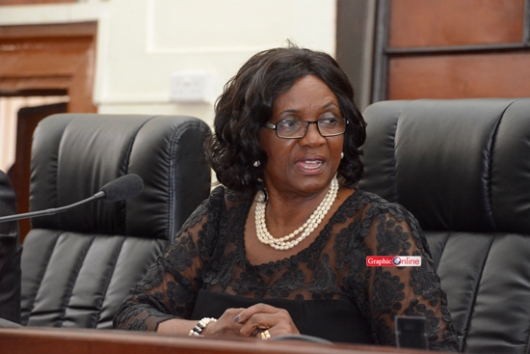That situation, she said, had created serious doubts in the minds of Ghanaians whether any public official or institution could stand up to scrutiny.
“Our country is caught in an unending spiral of decadence. Every day we read and hear of unspeakable corruption and abuse of the public purse by individuals and institutions entrusted with public funds. The situation has reached tipping point and our citizens genuinely wonder if any public official or institution can stand up to scrutiny,” she bemoaned.
The Chief Justice expressed this sentiment at the swearing-in ceremony of a professional magistrate and 21 career magistrates in Accra yesterday.
‘Live above reproach’
To stem the tide of corruption and abuse of public funds, Mrs Justice Wood reminded the magistrates that it was the responsibility of the Judiciary, as the lead law enforcement agency and in accordance with the justifiable expectation of the public, to live above reproach.
When they did that, she said, then they could effectively be used as instruments to hold others accountable.
She, therefore, urged the new magistrates to be particularly wary of any undue influences which would undermine their ability to fight corruption and abuse of public funds.
“In so saying, your conduct, both in and outside the courtroom, must conform with the highest ethical and moral standards. You must not fear or waver in your commitment to do what is right under the law, despite the pressure to do what is convenient,” she said.
Don’t be intimidated
She noted with concern that society sometimes tended to antagonise those who stood for what was right and rather supported wrongdoers to “perpetrate and perpetuate their unlawful and harmful actions, but this should not intimidate you in any way”.
Mrs Justice Wood cautioned the new magistrates that no one, especially the disadvantaged in society, should suffer injustice at their hands for even a day and later seek restoration of that justice through the appeal process, which could take months.
“Always bear in mind that this unique position you have ascended is a privileged one. It is not an opportunity for you to be demi-gods in your areas of jurisdiction but rather of supreme service to God and the citizens of Ghana,” she reminded them.
She said the Judiciary was the last bastion of good governance and the rule of law in any democracy and so their actions and conduct on the Bench would be closely monitored and evaluated by society.
The President of the Association of Magistrates and Judges of Ghana (AMJG), Mr Justice Dennis Adjei, urged the magistrates to be courageous in dispensing justice and not allow themselves to be intimidated by some lawyers who appear before them and might consider themselves more knowledgeable.
“You need courage to work as magistrates and not courage imbued with arrogance. An adjudicator who allows himself to be intimidated does contrary to what he has sworn to do and does not fit to hold that office,” he said.
Don’t give quick and erroneous decisions
Mr Justice Adjei reminded the magistrates that they were the first port of call by aggrieved parties and that they should not give quick and erroneous decisions with the assumption that the aggrieved person could not afford the cost of an appeal.
“A magistrate who perverts justice loses his integrity and does not deserve to remain on the bench”, he said.
For his part, a Justice of the Supreme Court and Director of the Magistrates’ Training Programme, Mr Justice Sulley N. Gbadegbe, said the magistrates had gone through a rigorous appointment process that had been instituted by the Appointments Committee of the Judicial Service.
He reiterated the call on them to uphold integrity in the course of work to earn the respect of those who appeared before them.
Integrity
“Issues of integrity have become more important in our country, as no day passes by without discussions being had on falling standards in the public sector, a matter that needs to be addressed if our efforts as a nation grappling with the challenges that confront us are to yield any dividends,” he said.
He also reminded them of the growing perception that some of their colleagues had been conducting themselves arrogantly and had been treating parties that appeared before them with disrespect.











 (Selorm) |
(Selorm) |  (Nana Kwesi)
(Nana Kwesi)